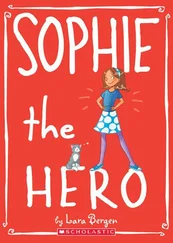—
“Stay as long as you want,” Vadik had said to Sergey. “Make yourself at home.”
And Sergey did.
It was amazing how fast he recovered. He had been thoroughly miserable for the first couple of days, but then one morning he woke up, made some Intelligentsia coffee (overbrewing it and splashing it all over Vadik’s white counter), and announced that he felt much better. He actually felt better than he had in months, possibly in years. After Vadik left for work, Sergey took the car, drove to Staten Island, picked up his clothes, drove back to Williamsburg, and spent the day exploring the neighborhood. When Vadik came home, Sergey told him that he had walked all the way to the Brooklyn Bridge and crossed into Manhattan and back.
“Did you know that if you go to the top of the bridge and stick out your open hand, you can see the entire downtown fit onto your palm?”
Vadik did know that. That was exactly how he felt when he first came to New York. Gigantic, omnipotent, bursting with energy. That was so many years ago.
The next morning Sergey announced to Vadik that he simply wasn’t a corporate nine-to-five guy. It had been a huge mistake for him to have spent so much time trying to fit in when it was impossible. Vica was too narrow-minded to see that. Virtual Grave was a brilliant idea, but trying to approach a developer with the mere idea for an app was an idiotic move. What he need was a working prototype so that he could ask investors for money and oversee the development himself. And now he had all the time in the world to build the prototype!
He wanted to tell Vadik more about his plan, but Vadik, being a “corporate, nine-to-five guy,” had to leave for the office. Sergey’s words stung precisely because lately Vadik had begun to doubt that he had made the right choice of profession. Back in Russia he used to enjoy programming. It was cool, it was exciting, it gave him a small adrenaline rush whenever he came up with some clever solution to a problem or wrote especially elegant lines of code. But more important, the job gave him the freedom to look for a perfect lifestyle. Programmers were needed everywhere — he could change companies, locations, even countries. The work was hard, the hours were long, but the money was pretty good, really good, in fact. Especially the money he made at DigiSly. The money allowed him to travel, to dress well, and to try out expensive hobbies like tennis, skiing, skydiving, or molecular cooking. But lately the senselessness of working so much was starting to dawn on him. He had to work for eight to ten hours every weekday and often on weekends too. It took him a couple more hours simply to unwind after work. So what time did that leave him to actually enjoy his life? A few hours every day and a bit more on weekends? It was ridiculous that he had to work so hard for a mere couple of hours of enjoyment, yet he could have lived with that if enjoyment was still there. But there was less and less of it, and whatever pleasure he experienced was becoming increasingly meager and forced.
So yes, it was hard not to envy Sergey, who plunged into his new life with youthful abandon. The first thing he did was to sign up on Coursera for several classes on new discoveries in linguistic patterns, web design, and user experience. Then he created a detailed schedule for his work over the next few weeks. He would wake up at six, make his awful coffee — spilling it on the counter every single time — and go for a run. Then he would buy and eat a bagel, and study for exactly four hours. At twelve thirty he would put on Vadik’s gym shorts — which looked ridiculously big on him — and do a hundred jumping jacks and fifty push-ups. “Draw the blinds when you do it,” Vadik told him. “Why?” Sergey asked. “I like it when people watch me.” Then he would make himself a sandwich, consume it at the tiny side table by the window, and put in four more hours of work. Then he would wait for Vadik to come home and make dinner, after which he would sometimes persuade Vadik to go out with him. He spent most of his weekends on Staten Island with Eric. He arranged it with his mother so that he could pick Eric up and drop him off without having to see Vica. He didn’t talk about her either. He would tense if Vadik mentioned her, and he never ever mentioned her himself.
Vica talked about Sergey all the time.
The first time she called Vadik was five minutes after Sergey arrived at his place.
“Is he there?” she asked. Her voice was thick with snot and tears.
“Yes,” Vadik said.
“Is he okay?”
“More or less.”
“Okay,” she said and hung up.
She called Vadik often.
“I just want to make sure he is okay,” she always said.
But Vadik sensed that there was some other motivation behind those calls. He was expecting her to ask him out or something like that, and the prospect was both frightening and intensely unpleasant. He still remembered the stickiness of her hug, the hunger in her eyes, when he first arrived in the country. As if she had been waiting for him, as if she had been hoping that he could fix whatever was wrong with her life. And then those two stupid hours on her couch five years ago and the feeling of shame afterward. Now that Vica was practically single, there was no stopping her. He would have to reject her, but he had no idea how to do that without hurting her. He desperately needed to talk to Regina, but Regina was reluctant to discuss their friends with him. “I don’t think I should meddle,” she told him. “I used to be Sergey’s girlfriend, remember? All of this is really awkward.”
Still, it was unfair that the entire burden of dealing with Vica and Sergey fell to Vadik. It was Regina’s duty to share some of that!
“What’s for eats?” Sergey asked, not raising his eyes from the screen.
“Chicken and broccoli.”
“Broccoli again? I think we should vary our lunches a little. Well, it doesn’t really matter, I guess, as long as we’re eating healthy. Did you remember the toilet paper?”
“Yep.”
“Ultra-strength?”
“Yes, ultra-strength!”
Vadik added the need for ultra-strength toilet paper to his mental list of things he couldn’t stand about Sergey.
The list also included:
Sergey’s inability to close cabinets after he opened them.
Sergey’s socks strewn all over the apartment.
Sergey’s habit of wearing Vadik’s socks, because he could never find his own.
Sergey’s bite marks left on wedges of cheese in the fridge.
A collection of dirty glasses was building up by Sergey’s bed. Every night he would put a glass of milk by the bed to drink during the night, but he never put the empty glass into the dishwasher in the morning; he would just take another glass the next night. So dirty glasses accumulated by the bed, a few cloudy with a milky film, others boasting some thick yogurtlike substance at the bottom or dried-up mold on the sides.
But the worst was Sergey’s singing on the toilet:
“Dance me to your beauty with a flaming violin.”
Vadik would groan and think: Burning violin, you idiot! Burning! Not flaming.
And there was also the question of money. In the three weeks that Sergey had spent at Vadik’s, he had yet to offer to pay for rent or groceries. It seemed as if contributing money had simply never occurred to him.
Vadik turned on the immersion cooker to preheat, washed the broccoli, and broke through the wrapper on the ground chicken container. Shortly after his breakup with Sejun, he invented this dish that was delicious, soothing, and easy to make. “Soothing?” Regina had asked. “Why do you need soothing food?”
“For my broken heart,” Vadik said.
“Your heart is not broken!”
Читать дальше












